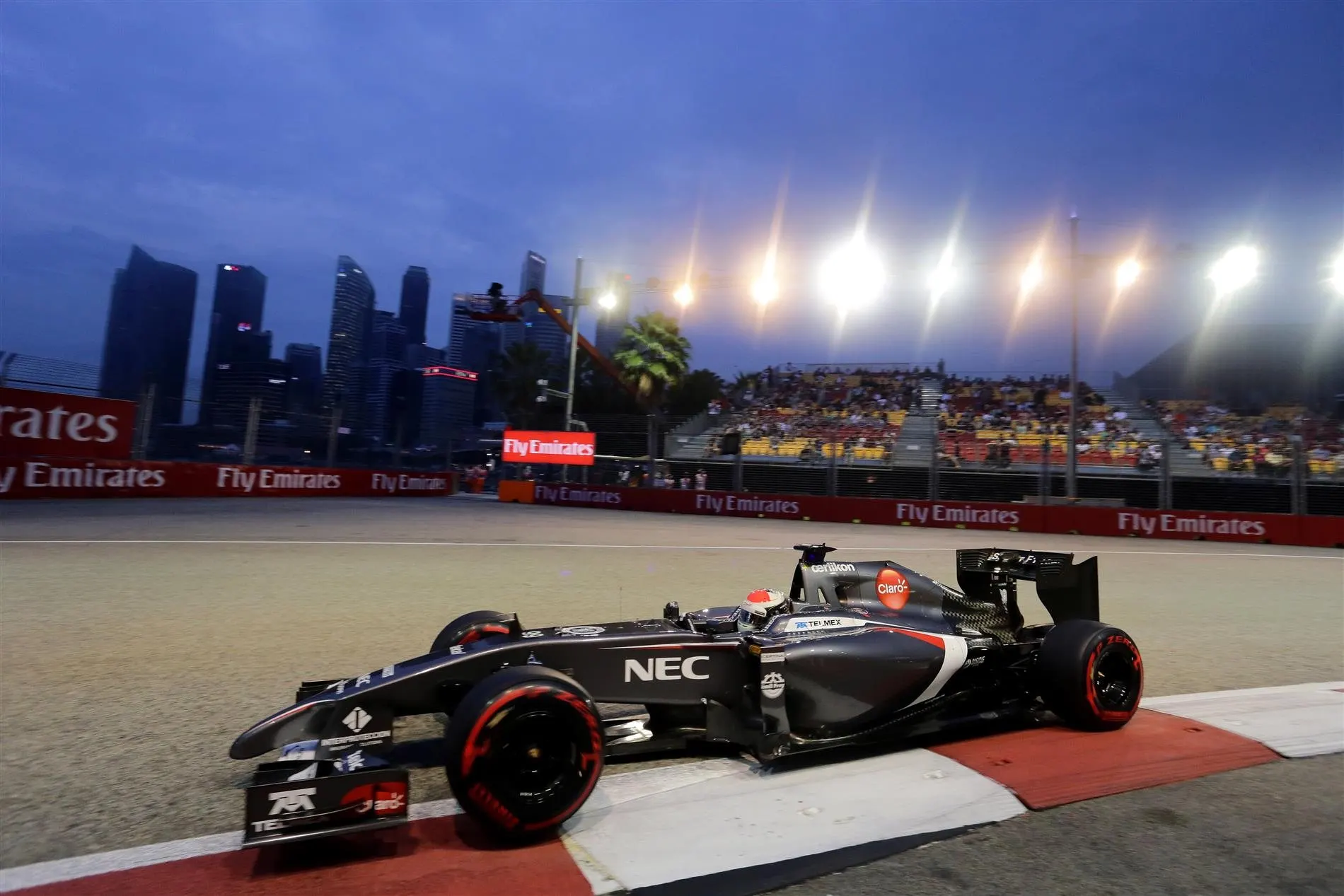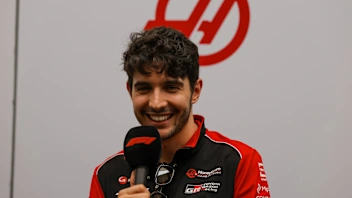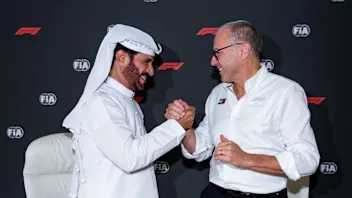Kaltenborn Q&A: We've not forgotten how to build good cars

Sauber are in the midst of the worst period in their proud history - the Swiss team have gone 14 races without scoring a point and in Singapore both of their cars failed to reach the finish for the fourth time this season. But team principal Monisha Kaltenborn refuses to be downhearted and, as she explains in this exclusive interview, with the right investment she's certain that Sauber will prosper once more...
Q: Monisha, no team has been linked more often in the last couple of years with being sold than Sauber. What is the state of affairs?
Monisha Kaltenborn: Well, since Peter (Sauber) bought the team back from BMW it was clear that we are always open to a strong partner. We always had a strong partner in the past if you look at Credit Suisse or Red Bull or Petronas - even if they have not been shareholders in the classic meaning - so this is nothing new to us. We also know that if you want to be competitive today you need a strong partner as a private team. From that perspective we have had several talks in the past - and that is all I can say.
Q: This time there are reports that Canadian billionaire Lawrence Stroll is the man with the ‘golden touch’. Wouldn’t that be exactly what Sauber needs?
MK: As I said, a strong partner is always a good fit - but I cannot comment any more at this point.
Q: What happened with the ‘Russian deal’ around driver Sergey Sirotkin that seemed to fall apart and disappear from view quite suddenly last year after a lot of hype?
MK: It is not falling apart. The problem is things take their time and there is no way that we can affect that time line. And maybe things come up for the other side that simply were given more priority. The line between private and public is a very thin one in Russia. Certain political situations equally affect partnerships - and that has also happened. So there is not much you can do but wait.
Q: Would a modification in ownership be welcomed - to sell off a share of the team - if you want to avoid a complete takeover?
MK: Let me put it this way: with a strong partner we would be able to be more competitive.
Q: How will Sauber’s business model be affected in the future? There is no indication at the present time of a regulated cost cap being agreed, so if costs don’t come down does that mean you will have to increase your budget?
MK: We are engaged in talks and if the costs are not going to be regulated - which would be very unfortunate for the sport because it has a negative impact on our image - you, of course, have to work on the income side through investment or sponsorship. That is not an easy task these days.
Q: Can you give us three reasons why Sauber are attractive to sponsors?
MK: We are a long-established team with a strong tradition. We have a very good infrastructure and basis to be able to compete on a good level - and even at the top level if we get sufficient funding - and our solid basis allows us to not require as much funding as others might need to reach that level. The best proof of this is when BMW bought the majority in the team. You had to have everything right in your records and history for a company like BMW to acquire you.
Q: Speaking bluntly, the performance of the team this year has been a disaster. The good news is, as we’ve seen with Williams this season, race performance can be cyclical. Are there even the slightest indications that Sauber could follow a similar improvement path to Williams in 2015?
MK: There are. We have not forgotten how to make good cars. This year’s challenger is not one of our good cars - but it’s also not the worst car! We know why this all is happening. We know where we went wrong, but we also see that the powertrain plays an important role this year - that has been proven by other powertrains throughout the grid. We do not have the most competitive one, which makes it very difficult for a team like ours when you are limited on the resources to try and compensate. But we have to live with that and I am sure that our engine supplier is doing everything because they (Ferrari) are suffering equally. So we both have to go through this.
Q: You rightly said that Ferrari are also suffering. What does that mean for Sauber?
MK: We have a very long lasting partnership with them. We’ve been through good times with them and challenging times - and this now is a very challenging time! But you have to have trust in your partners. Maybe they realised what they have not done right - but it is not on us to judge that because we are not part of that. Yes, we see the disadvantages and see that the engine has to improve - and they are working on that.
Q: Is the main focus of the remaining races to keep the financially-valuable P10 in the constructors’ championship?
MK: We have to secure what we can. We also have to say that there have been races like Monaco where it looked like we’d get in the points - and then we didn’t. So no predictions, but we have to try to do everything we can do within our resources.
Q: What are you going to do with your two current drivers? Now is traditionally the time for cockpit reshuffles - will you be part of that?
MK: We do have several options and we plan to announce our driver line-up towards the end of the season. We will not speculate with any names…
Q: What about Jules Bianchi? His Ferrari connection and his two points for Marussia should be a good recommendation…
MK: Ha, nice try. But as I just said, no names and as far as I remember ‘Jules Bianchi’ is a name!
Q: There was a new aero package on the car in Singapore, but it was obviously not the magic formula that you were waiting for…
MK: Well, Adrian’s (Sutil) first comments were that the car felt more stable. But we really could not assess it in depth because we had issues with the control unit. The energy recovery was not coming in the way it should.
Q: Is that Sauber’s final upgrade package of the season?
MK: Yes, in terms of a package, but there might still be bits and pieces.
Q: So if the 2014 car was not the ‘real thing’ what about next year’s challenger? How far along are you with that?
MK: It is in the making. Sauber has a bit of a history with always struggling when massive rule changes came into effect, but we have always been able to bounce back in the next season. Just think back to the exhaust [-blown diffuser] issue: we didn’t get it right in the first year, but the following season we were right there getting a couple of podiums. So I am confident that whatever we learn on this year’s car, the mistakes, we will not make them on the new car.
Q: Singapore might have been your best shot to get into the points, but what about all the tracks that follow? They’re mainly high-speed circuits…
MK: We have to take it as it comes. We have to avoid making mistakes as we know that we cannot do things from our own strength, so we have to make sure that we are there if others make mistakes.
Q: The discussion over third cars was fired up again in Singapore - what do you make of that?
MK: I think it has to be made sure that diversity is maintained - that is the DNA of Formula One. If for some reason that cannot be maintained then the third car is a much better solution than having customer cars. The idea of a third car is not something new - we have had that in the past - so it is possible to use it in a sensible way.
Q: So should bad turn to worse for some teams, you would rather advocate the third car solution than customer cars?
MK: For sure.
Next Up
Related Articles
 Getting to know the real Esteban Ocon
Getting to know the real Esteban Ocon F1, the FIA and 11 teams sign 2026 Concorde Agreement
F1, the FIA and 11 teams sign 2026 Concorde Agreement ‘I have achieved my dream, that little boy's dream’ – Norris
‘I have achieved my dream, that little boy's dream’ – Norris F1 AcademyHaas name Countryman as 2026 F1 ACADEMY driver
F1 AcademyHaas name Countryman as 2026 F1 ACADEMY driver Sainz hopes point-less finish in Abu Dhabi ‘serves as a wake-up call’
Sainz hopes point-less finish in Abu Dhabi ‘serves as a wake-up call’ Norris collects World Championship trophy at FIA Awards
Norris collects World Championship trophy at FIA Awards